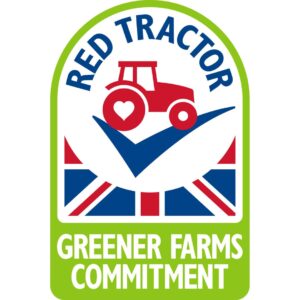The NFU has clarified its position on Red Tractor’s plans to introduce a voluntary Greener Farms Commitment (GFC), alongside its core scheme from April 2024.
Red Tractor said GFC will enable farmers to make commitments and track their own progress across five key areas for environmentally focused farming: Carbon foot printing; Soil management; Nutrient management; Waste management; and Biodiversity.
It will have its own logo, ‘enabling farmers and British agriculture to demonstrate their environmental credentials to consumers, whilst also differentiating the high quality of British products compared to international competition’, Red Tractor said.
However, the announcement, which included a supportive comment from the British Retail Consortium and four major retailers, but no comments from the NFU or any farmer representatives, has prompted a lot of criticism from within the farming sector.
Farmers have complained over a lack of consultation and have expressed fears that they will incur a heavy cost under the initiative, with no commitment that will be recouped from the supply chain.
 The NFU’s role, as a member on the Red Tractor board, has also been under the spotlight. Responding initially, NFU deputy president Tom Bradshaw said: “The NFU have not been involved with the development of the bolt-on module. I know some are reading the statement and wilfully assuming that we have.”
The NFU’s role, as a member on the Red Tractor board, has also been under the spotlight. Responding initially, NFU deputy president Tom Bradshaw said: “The NFU have not been involved with the development of the bolt-on module. I know some are reading the statement and wilfully assuming that we have.”
In a subsequent Q&A addressing concerns over its plans, Red Tractor said the NFU is represented on the Red Tractor (AFS) Board, which ‘unanimously agreed this approach in September and has discussed this work regularly over the last two years’. Red Tractor said it believes this approach fits with some of the NFU’s guiding principles.
Robustly challenging
In a statement on Wednesday night, NFU Deputy President Tom Bradshaw said the NFU has long supported Red Tractor Assurance, but stressed that, ‘for the past 18 months we have been robustly challenging the governance behind the development of this environment module’.
“I was alarmed that it had been previously decided by the Red Tractor board that in developing this module all of the technical committees and sector boards where NFU members sit would be bypassed. I have found this position completely unacceptable and said so repeatedly,” he said.
“We have never said that as one of the 18 members of the Red Tractor board we didn’t have knowledge of the module, but at no point have expert NFU members and advisors been involved with the development of the crucial details within it.
“Consequently, at the final Red Tractor board meeting where this was agreed in September, I again argued for greater oversight, and significant concessions were gained by the NFU to allow the module to be scrutinised by the technical advisory committees of all farming sectors and the sector boards.”
He said the NFU fought for and gained agreement to set up a Development Advisory Panel to further scrutinise development of the greener farms work, and highlighted ‘significant concerns’ about how this could work in the devolved nations with their differing agricultural policies, who have not been involved at all.
“With these concessions won we felt that the board could approve the position, sending it out for this wider scrutiny,” he said. “The surprising British Retail Consortium (BRC) statement on the Greener Farms commitment has made many question the validity of the process agreed above.
“As it stands, there has been no clear vision delivered as to how this is going to add any value to farm gate and yet it will help retailers deliver more of their ESG requirements, which ultimately brings value.
“I, more than anyone, want British farming to stand up to the challenges of imports from around the world; to demonstrate the sustainability credentials of British farming and to drive solutions to the environmental challenges we face.
“This module could provide some of the solutions if deployed in the correct sectors and with minimal cost burden, and after the proper scrutiny that was agreed.
“Ultimately however, the additional cost cannot be shouldered by our farmer members and the supply chain will have to pay a premium for the associated increase in costs.”




